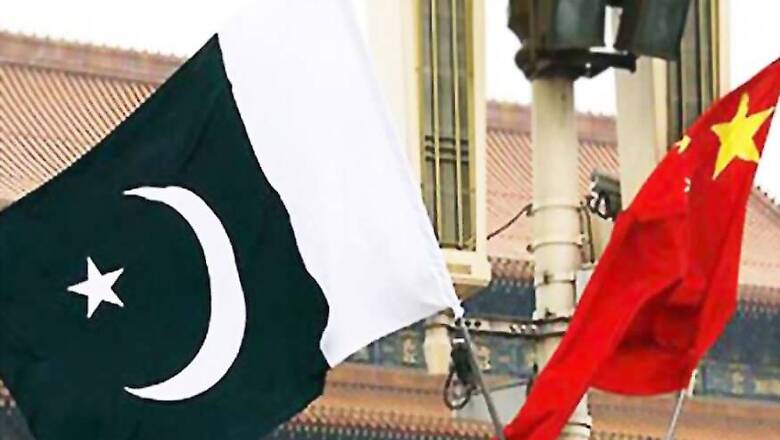
views
Watchers of geo-economic space must have had an "I told you so" moment recently. The news was that in the background of COVID-19, Pakistan has expressed its inability to service the power sector loans associated with the China Pakistan Economic Corridor (CPEC), a flagship project of the larger Belt & Road Initiative (BRI). The predictions about unviability of many of these BRI projects by different parties like India, the United States and the International Monetary Fund (IMF) are a matter of public record for a long time now. But this news coming now begets a question. What will be the likely impact of this pandemic on China’s flagship BRI?
Apart from the fact that the BRI was already facing many criticisms, this pandemic has also come at a time when the global economy was already facing certain headwinds. The US-China trade spat was going on, commodity prices were going down and oil had already hit a record low. Now, due to this pandemic, the IMF predicts a global recession, further compression of global demand and trade with steeper downward pressure on oil and other commodity prices. It will also witness exchange rate fluctuations where currencies of weaker economies may suffer more. Now, let us consider the likely effects of these changes on BRI stakeholders.
One of the important destinations of this project in Europe is Italy itself, which has signed 29 agreements. Even before the outbreak of COVID-19, Italian Prime Minister Giuseppe Conte had started criticising BRI projects, saying, “The Chinese initiative must … develop in an open and inclusive way, respecting the standards and principles enshrined in the EU strategy." Now, with rising resentment against China’s poor and opaque handling of the outbreak, these projects are facing increased scrutiny.
The BRI projects in Africa are also under increased peril. A part of the loans are concessional loans given at very low interest rate for buying political capital in Africa, i.e. to get votes in the United Nations. But the majority of loans are semi-commercial in nature with interest rates at least 2% higher as compared to the IMF or Paris Club members with greater collateral requirements. As most of these projects are in commodities sector like mining, depression in global commodity prices makes the chances of repayment even more difficult. Meanwhile, China’s soft power in Africa also suffers due to news of increasing racial discrimination and prejudice against Africans whereby they are seen as carriers of this virus and they are being asked to vacate homes rendering them homeless.
In this emerging scenario, Pakistan has asked for interest reduction on power sector loans from LIBOR+4.5% to LIBOR+2 and increasing the period of repayment to 20 years from 10. Caught in the pincer of the US and the IMF on one hand and China on another, truth be told, Pakistan is in no position to service these loans any way. With dwindling exports and remittances, weakening currency due to flight of hot capital and contracting economic activity, the country is staring at possible default. But again, if China agrees to renegotiate it may open a Pandora’s box as most of the projects across continents face similar problems. For example, the Gwadar port project and the road from Gwadar to Xinjiang is another dud waiting to implode. But then, what about those similar expensive “road-to-nowhere” in Montenegro, or that expensive but abandoned free trade zone in Kyrgyzstan, or that still-born Melaka Gateway project in Malaysia, or similar such projects in other Africa countries?
As the disease has spread and is getting exacerbated, a “Hambantota solution” may also be difficult whereby China calls and acquires the collateral in case of loan repayment default. But such solutions on mass scale, with multiple defaults across continents seems less feasible when China itself is perceived as the reason for causing this pandemic and precipitating the crisis. Other influential countries may also not appreciate China acquiring real estate all over the place due to loan defaults post-COVID-19.
In case of China forcing recovery, the debtor countries can come together and explore the possibility of mass write-offs as these liabilities may be argued to be in the nature of ‘odious debts’. Under International Law, some of the characteristics of odious or illegitimate debts are that they may have been contracted involving corrupt means, or by despotic rulers and may not have been properly used for the public welfare or the lender may have co-responsibility for financing failed projects. If characterised as such odious debts do not entail any liability of repayment. It may very well be argued that a lot of BRI projects across the globe satisfy many of these characteristics. Calling it so may also be just, fair and equitable.
To sum up, the weaknesses in the design of BRI were already there. What has happened now is that due to global slowdown China’s capacity to finance extravagant projects may have come down. On the other hand debtor countries may find it increasingly hard to afford these projects now. The fact remains that the virus originated in China and the pandemic spread got initial boost due to China’s poor handling, which has put the global economy on ventilator, thereby further jeopardising large extravagant BRI projects. To borrow from current medical jargon, there were pre-existing conditions and morbidities in the BRI. COVID-19 has just come at an un-opportune time. In that sense, this virus may have just drained the water from the swimming pool revealing that many were simply swimming naked!
(The author is an IRS officer. He holds a master's degree in public policy from the University of Manchester. Views are personal.)


















Comments
0 comment